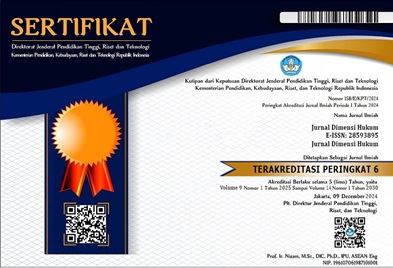TINJAUAN YURIDIS-EMPIRIS ATAS TRANSPARANSI LEGISLASI DPR STUDI KASUS PEMBAHASAN RUU TNI DI LUAR GEDUNG PARLEMEN
Kata Kunci:
transparansi, DPR, legislasi, UU TNI, partisipasi publikAbstrak
Proses legislasi yang transparan, akuntabel, dan partisipatif merupakan pilar penting dalam sistem hukum yang demokratis. Penelitian ini bertujuan untuk mengevaluasi transparansi proses legislasi Dewan Perwakilan Rakyat (DPR) dalam pembahasan Revisi Undang-Undang Tentara Nasional Indonesia (UU TNI) yang dilakukan di luar Gedung Parlemen. Penelitian ini menggunakan pendekatan yuridis normatif dan yuridis empiris. Data diperoleh melalui studi dokumen terhadap peraturan perundang-undangan, kajian pustaka, serta wawancara dengan narasumber kunci yang terlibat dalam isu legislasi dan keterbukaan informasi publik. Hasil penelitian menunjukkan bahwa pembahasan revisi UU TNI yang dilakukan di luar Gedung DPR menimbulkan persoalan serius terkait prinsip keterbukaan, partisipasi publik, dan akuntabilitas lembaga legislatif. Meskipun diizinkan secara formal oleh Pasal 254 ayat (3) Peraturan DPR Nomor 1 Tahun 2020, praktik ini bertentangan dengan semangat keterbukaan sebagaimana diatur dalam Pasal 5 huruf g Undang-Undang Nomor 12 Tahun 2011 dan Pasal 28F UUD 1945. Ketertutupan lokasi dan minimnya akses publik terhadap proses tersebut berpotensi mengurangi kepercayaan masyarakat terhadap DPR sebagai wakil rakyat. Penelitian ini merekomendasikan reformasi tata kelola legislasi agar proses pembentukan undang-undang dilaksanakan secara lebih terbuka, transparan, dan inklusif, termasuk melalui penggunaan teknologi digital untuk memperluas akses publik. Temuan ini diharapkan memberikan kontribusi nyata terhadap penguatan prinsip demokrasi dalam sistem legislasi nasional.
A transparent, accountable, and participatory legislative process is a crucial pillar of a democratic legal system. This study aims to evaluate the transparency of the Indonesian House of Representatives (DPR) in the legislative process, particularly in the revision of the Indonesian National Armed Forces Law (UU TNI), which was conducted outside the official parliamentary building. The research adopts both normative and empirical legal approaches. Data were collected through document analysis of relevant legislation, literature reviews, and interviews with key informants involved in legislative and public transparency issues. The results indicate that conducting the legislative discussion outside the Parliament building raises serious concerns regarding public access, openness, and the accountability of legislative institutions. Although such practices are formally permitted under Article 254(3) of DPR Regulation No. 1 of 2020, they contradict the principle of openness as mandated by Article 5(g) of Law No. 12 of 2011 and Article 28F of the 1945 Constitution. The lack of public access and the use of closed, non-formal venues potentially diminish public trust in the DPR’s role as a representative institution. This study recommends comprehensive legislative governance reform to ensure future legislative processes are more transparent, inclusive, and accountable. It also highlights the importance of utilizing digital technology to enhance public participation and oversight. These findings are expected to contribute significantly to the strengthening of democratic principles within Indonesia's legislative practices.





